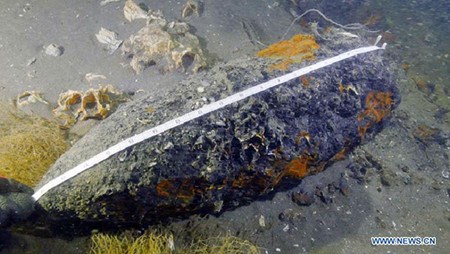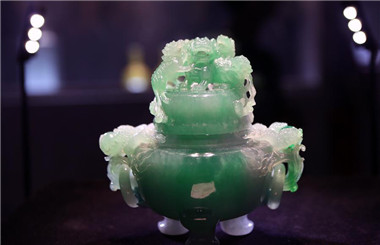Excavation of famed Chinese warship underway
( Xinhua ) Updated: 2015-10-04 12:09:34
 |
|
An archeological team from the National Center of Underwater Cultural Heritage has salvaged more than 100 items from the wreck during the past two months. [Photo/Xinhua] |
Chinese archaeologists are set to start a new round of underwater excavation after a famed late Qing Dynasty (1636-1912) warship was discovered in the depths of the Yellow Sea.
The shipwreck that was code-named "Dandong No 1" has been tentatively identified as the Cruiser Zhiyuan of the Beiyang Fleet.
But Song Jianzhong with the National Center of Underwater Cultural Heritage says it is still too early to make a final conclusion on the ship and its history.
"The relics and information currently in hand indicates it's the wreck of the warship Zhiyuan, but more work needs to be done before the publishing of the final conclusion."
The shipwreck was first discovered in 2013.
In the past month, over a hundred relics have been salvaged from the depths of the Yellow Sea, including canons, shells, and other artillery.
The most crucial piece of evidence for the ship's identity is a shattered porcelain plate that features the words 'Zhiyuan' written in the middle of its back.
Song Jianzhong says all of the recovered items will studied further.
"Archaeology mainly focuses on the investigation, excavation, study and protection of cultural relics. Items to be found during the current underwater probe will be sent to labs where they will undergo procedures of de-watering, desalination and de-sulfated before being renovated and pieced together."
Also among the findings is a boiler cap found 30 meters away from the wreck at the bottom of the sea.
Sa Su, a Chinese scholar of Japanese studies, says the artifact could reveal details of the final moments of the brave sailors who operated the ship during combat.
"It's said that the sailors sealed the boilers at last in the hope of enabling them to generate more power and make the ship run faster than usual. Only with that, could it catch up with Japanese warships that were more advanced. But as seawater poured in after Zhiyuan's hull was penetrated by shells, the boiler exploded with the cap blown out."
The 2,300-tonne warship, with 246 officers and soldiers aboard, was lost in the Battle of the Yellow Sea on September the 17th, 1894, during the first Sino-Japanese war.
Captain Deng Shichang has been well remembered by Chinese people for ordering a full-speed charge at the enemy's flagship in order to protect the flagship of the Chinese fleet.
But just one kilometer away from its target, the Zhiyuan exploded. Captain Deng Shichang later drowned himself and his dog.
The Chinese fleet lost four warships during the five-hour battle.
The archaeologists are expected to finish the excavation by the end of the National Day holiday on Oct 7.
The shipwreck won't be pulled out of water in the near future due to concerns over a structural collapse.
|
|
|
|
|
|
|
|




















 Raymond Zhou:
Raymond Zhou: Pauline D Loh:
Pauline D Loh: Hot Pot
Hot Pot Eco China
Eco China China Dream
China Dream China Face
China Face






